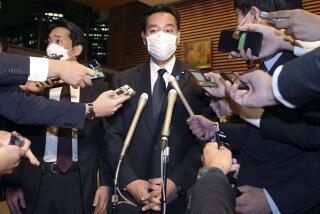Corporate Giants Pressure Japan’s Politicians to Stop Visiting War Shrine
- Share via
TOKYO — Some of Japan’s corporate heavy hitters have set aside their usual caution and begun to demand that senior politicians stop making pilgrimages to Yasukuni Shrine, saying the visits to the controversial Tokyo war memorial threaten crucial economic ties with China.
“It’s not good to continue with this irritating situation -- like having a fish bone stuck in our throat,” Canon Inc. Chairman Fujio Mitarai told reporters last week upon assuming leadership of the powerful Japan Business Federation. “It is the task of the government to thoroughly and swiftly resolve it.”
Top corporate executives have long been uneasy about Prime Minister Junichiro Koizumi’s annual trips to the shrine, which memorializes war dead and war criminals alike. The visits provoke furious anti-Japanese feelings in South Korea as well as China, which were victims of Japan’s militaristic past. But until recently, the Japanese business community has been circumspect about expressing criticism of Koizumi’s Yasukuni visits.
In the last two weeks, however, members of the business establishment have boldly called for the government to create an alternative venue to honor Japan’s war dead.
Mitarai’s comments echoed those of Kakutaro Kitashiro, chairman of the Japan Assn. of Corporate Executives, who this month challenged Koizumi to stop visiting Yasukuni, saying: “There can be no stable development while national sentiments are in conflict.”
Some business executives say deals in China are being put at risk by the sour political atmosphere.
“The business lobby has been too quiet,” said Junichiro Sano, chief executive of Dalton Investments, a Tokyo asset management firm.
The challenge to Koizumi’s brand of populist nationalism comes as candidates position themselves to replace him as leader of the governing Liberal Democratic Party. Koizumi will step down in September.
The leading candidate to succeed him is Shinzo Abe, 51, who also pays homage to the war dead enshrined at Yasukuni and downplays the effect the visits have on Japan’s image across Asia. Abe has acknowledged that relations with China must be improved but has been coy about how he would do so. And members of the business establishment and some LDP political circles are concerned that an Abe-led government would perpetuate the diplomatic standoff with Japan’s Asian neighbors.
Improving Japan’s relations with its neighbors, especially China, has become a key issue in the leadership campaign. A poll conducted in March by the Foreign Ministry showed 78% of respondents believed it was important to improve relations with China. And an April poll for the Yomiuri Shimbun newspaper said 61% believed Koizumi was the cause of the troubles.
Those fears have contributed to the growing momentum behind the putative candidacy of Yasuo Fukuda, 69, a critic of the Yasukuni visits and the son of a former prime minister best remembered for his pro-Asian diplomacy. Fukuda’s still-undeclared candidacy has become the rallying point for party members and back-room power brokers who want an end to the political chill with China and South Korea.
The leadership race offers a window for critics of the Yasukuni visits to speak out. Those who previously did so were, at best, derided as too fawning toward China and, at worst, attacked by nationalist extremists. In January 2005, Molotov cocktails were thrown at the home of Yotaro Kobayashi, chairman of Fuji Xerox Co. and head of the Japan-China Friendship Committee for the 21st Century, after he urged Koizumi to avoid Yasukuni.
Koizumi’s defenders accuse the Communist Chinese government of stoking anti-Japanese sentiment to deflect attention from its own murderous past, notably the mass killings of the Cultural Revolution period.
But there is a growing awareness here that Chinese and Korean memories of Japanese militarism will not simply fade with time. Beijing has been known to invoke Koizumi’s Yasukuni visits to portray Japan as an untrustworthy country unwilling to atone for its history of aggression.
The diplomatic character assassination has left Japan on the defensive.
“The Chinese are very clever diplomats, very logical, while Japanese politicians are untrained and naive in foreign affairs,” said Mie Teno, a senior Japanese business executive with extensive contacts in China who is among those pressing for better relations between the two countries.
“I like Mr. Koizumi -- on economic issues he has very good instincts,” she said. “But Yasukuni is his Achilles’ heel.”
More to Read
Sign up for Essential California
The most important California stories and recommendations in your inbox every morning.
You may occasionally receive promotional content from the Los Angeles Times.










